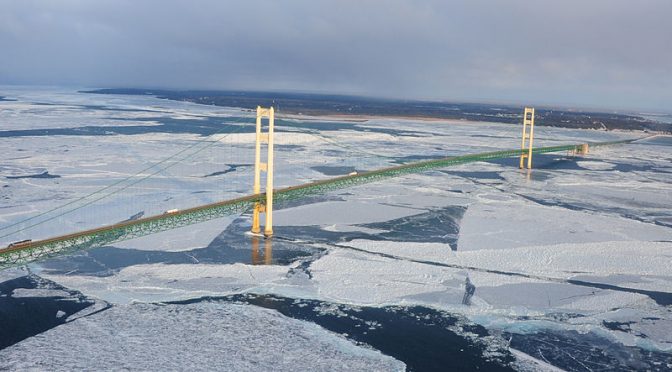
The two hand-shaped maps of the Upper and Lower Peninsulas of Michigan cup the hydrological corridor that links Lake Michigan and Lake Huron. The whip-sawed waters of this passageway contain some of the mightiest currents in the Great Lakes, which intermittently thrash around a volume of water ten-times that which flows over Niagara Falls. The powerful Straits of Mackinac reach a 3.5-mile distance at their widest width and a 295-foot range at their deepest depth.
But below the surface of the formidable water body lies a slipshod vein at risk of rupture: Line 5. It was constructed in 1953 by Enbridge, a leviathan oil corporation headquartered in Calgary, Canada. This particular pipeline—though it is difficult to disentangle from the web of Enbridge lines that sprawl eastward and southward across the US—has had 33 leaks on land in its lifetime. The construction of the line itself is problematic at best, distinguished by its sub-par coating, not-so-thickness, and (lack of) physical support. A leak along the length exposed in the open waters of the Straits is likely not a matter of if, but rather when. And when it does rupture, Michigan’s marine environment, blue economy, and fresh-water dependent residents (i.e. all residents) will bleed too. Oh, and so may Enbridge, but that will just make notch (read: leak) number 34 in their bedpost.
We recently welcomed an expert panel into our studio to discuss Line 5, learn from one another, empower ourselves, and encourage our listeners to take part in the conversation around the crude oil conduit. Sat around the table were David Schwab of the Graham Sustainability Institute’s Water Center, Beth Wallace of the National Wildlife Federation, Sean McBrearty of Clean Water Action, and Holly Bird, an attorney and activist with the Water Protectors Task Force.*
Here are some of our favorite bits from the conversation:
“Line 6B was fit ‘fit for service’ when it broke and spilled over a million gallons [of oil] into the Kalamazoo [River]. Enbridge had a natural gas line explode in Ohio last week. In 2012, they had reviewed that it was ‘fit for service’. That line was also built in 1953, just like Line 5.”
— Sean McBrearty
“At that point [the Ottawa & Chippewa] had to ask [Enbridge], ‘What’s more important, the oil running through the pipes or the water that the pipes run through?’ None of them could answer that the oil was more important, but that’s their job.”
— Holly Bird
“I could not think of a worse place in the Great Lakes to have an oil spill.”
— David Schwab
“It’s beyond me that we are still discussing this as an issue.”
— Beth Wallace
After listening to the episode, and perhaps taking a walk to calm your nerves, be sure to turn your reaction into action. Near the end of the show, our four guests will talk about how you can make your voice heard. You can visit their websites at Oil and Water Don’t Mix, Clean Water Action, Michigan Water Protectors Legal Task Force, and the National Wildlife Federation. Check out David’s report on the worst case scenarios of a Line 5 spill here.
Business leaders can make an impact by joining the Great Lakes Business Network. For a wide range of opinions on Line 5, including several that Bella mentioned on air, check out this MLive article.
Listening to this may keep your temper hot, so until next week, all I ask is that you keep it here. Signed, Aurora Aparicio.
*The Hot In Here gang recognizes that not all perspectives are present in this particular discussion of Line 5, and we intend to record a follow-up episode that addresses more of the political and economic arguments involved.

